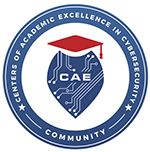LCCC Center for Cybersecurity


LCCC Designated as a National Center of Academic Excellence in Cyber Defense Two-Year Education
The National Security Agency and the Department of Homeland Security have designated Lehigh Carbon Community College as a National Center of Academic Excellence in Cyber Defense Two-Year Education (CAE2Y). The designation is through academic year 2029. This designation means that LCCC now has a position on the cyber defense landscape.
 The National Centers of Academic Excellence in Cybersecurity (NCAE-C) Program’s History
The National Centers of Academic Excellence in Cybersecurity (NCAE-C) Program’s History
In 1999, the National Security Agency (NSA) launched the Center of Academic Excellence in Information Assurance Education (CAE-IAE) program. Under this program, an institution could receive the CAE-IAE designation if it passed rigorous curriculum and program requirements.
Connect with the CAE Community
LCCC is one of 10 higher-education institutions in Pennsylvania with this designation and the only community college.
Higher education plays a key role in addressing the critical shortage of professionals with the skills to contribute to the protection of the National Information Infrastructure. NSA and DHS partner with academic institutions to enhance cybersecurity education nationwide and to develop the next generation of cyber security experts. Prospective schools are designated after meeting stringent CAE criteria and mapping curricula to topics such as cyber threats, data analysis, cryptography, policy, ethics and more.
These criteria are common to all of the four-year institutions that have earned this designation and should allow LCCC students increased transfer opportunities to some of the nation’s top universities.
While many cybersecurity jobs are open to students who attend an accredited cyber degree program, the additional designation helps to ensure that they are studying concepts and practices deemed important by two of the largest employers in the cybersecurity world: the National Security Agency and the Department of Homeland Security.
National Cyber League
LCCC once again hosted a cyber security team that competed in the National Cyber League (https://www.
LCCC’students included Silver Bracket participants Joanne Nacipucha, Juan Parrales and Joshua Urmy (pictured), as well as Arlington Bell, Malik Camacho, Langston Hollomon, Timothy Lehman, Garrett Stinnard, Dominique Totani, Ethan Williams and Gabrielle Grafenberg. Urmy was LCCC’s highest scorer.
LCCC’s Cyber Center
Contact
Blaine Easterwood, MSE
Assistant Professor, CIS
Phone: 610-799-1050
Email: beasterwood@lccc.edu
National Cyber League
LCCC once again hosted a cyber security team that competed in the National Cyber League (https://www.nationalcyberleague.org/) competition, in which over 3,000 students competed nationwide.
LCCC’ students included Silver Bracket participants Joanne Nacipucha, Juan Parrales and Joshua Urmy, as well as Arlington Bell, Malik Camacho, Langston Hollomon, Timothy Lehman, Garrett Stinnard, Dominique Totani, Ethan Williams and Gabrielle Grafenberg. Urmy was LCCC’s highest scorer.


